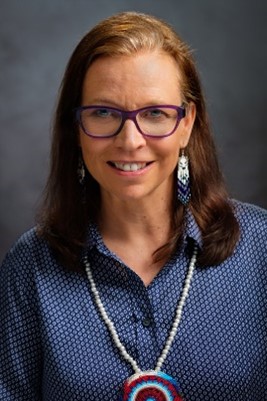
Honoring Health Newsletter
From the NIH Tribal Health Research Office | Summer 2024
Posted on June 25, 2024
Director's Message
News and Events
For regular Tribal health news updates, visit the NIH Tribal Health News webpage.
Boarding School Harms and Intergenerational Healing Initiative
Building on the U.S. Department of the Interior Indian Boarding School Healing Initiative, THRO will conduct a 2-day summit with AI/AN boarding school survivors, Tribal leaders, practitioners, and subject-matter research experts in intergenerational trauma. The summit will assess current gaps in knowledge and identify ways to create culturally grounded research interventions and prevention efforts to not only mitigate the deleterious impact of boarding school trauma on AI/AN families and communities, but also promote healthful behaviors and wellness. A particular focus will be on building back what was lost or disrupted (e.g., language) through the boarding school process, as these are essential factors involved in healing, healthful behaviors, and wellness.
Indigenous Data Sovereignty Policy
THRO has launched the development of an IDS Policy with an NIH working group, co-chaired by Dr. Kayla Davis (Osage) and Mr. Michael Hahn. THRO and the IDS workgroup will establish a robust IDS Policy at NIH through a series of Tribal and NIH listening sessions, at least two formal Tribal Consultations, and a 1-day summit with AI/AN IDS subject-matter experts. This policy will identify key principles and practices in honoring the right of Tribal Nations to exercise their sovereign authority over their data, particularly when such data have the potential to impact the social, cultural, economic, and general welfare of their Tribal Nations. This authority includes governing the collection, ownership, stewardship, sharing, transfer, use and reuse, and disposal and disposition of data collected from and about their Tribal populations. This policy will provide clearer guidelines for NIH intramural and extramural expectations for data stewardship and sharing that will be Tribally and NIH informed, allowing for consistent and streamlined data practices across NIH that align with Tribal research codes, laws, and ordinances.
Tribal Consultations
National Institute on Minority Health and Health Disparities Initiative for Improving American Indian and Alaska Native Cancer Outcomes
The NIH National Institute on Minority Health and Health Disparities requested input on an Initiative for Improving American Indian and Alaska Native Cancer Outcomes. The initiative will support such efforts as research, education, outreach, and clinical access to improve the screening, diagnosis, and treatment of cancers in culturally respectful and practical ways among AI/AN populations, particularly those living in rural communities.
The goal of this Tribal Consultation was to gather input on this initiative and understand the research priorities and cultural approaches important to Tribal communities to be captured in the initiative. NIH values the opportunity to learn how the initiative for improving cancer outcomes might help advance the goals and strategic priorities of Tribal Nations.
The NIH Tribal Consultation on the Initiative for Improving American Indian and Alaska Native Cancer Outcomes event was held May 22, 2024. The Notice of Funding Opportunity Announcement for this initiative can be found at RFA-MD-24-009.
Alzheimer’s Disease and Other Types of Dementia Real-World Data Platform
The NIH National Institute on Aging requested input on the development of the Alzheimer’s Disease and other types of dementia Real-World Data Platform. The Platform aims to serve as a central hub of secure access for many types of data collected from a variety of real-world sources to promote more inclusive clinical research and improve health outcomes for older adults and people living with dementia.
The goal of this Tribal Consultation and Urban Confer was to gather input on the development of the Platform in a way that recognizes Tribal sovereignty and Tribal data ownership; respects and protects the privacy of individuals and communities who are represented in the Platform; and helps ensure that knowledge and potential dementia treatments made possible because of the Platform are culturally appropriate and applicable to AI/AN populations.
The NIH Tribal Consultation on the Alzheimer’s Disease and other types of dementia Real-World Data Platform was held January 5, 2024.
Funding Opportunities
Native American Research Centers for Health Funding Award Opportunities
The NIH National Institute of General Medical Sciences Division for Research Capacity Building supports Native American and Tribal research efforts through the Native American Research Centers for Health (NARCH) program. The program funds federally recognized AI/AN Tribes and organizations for health research, research career enhancement, and research infrastructure enhancement activities.
NARCH offers two award programs: The S06 Award Program (PAR-23-166) and the R34 Planning Grants Award Program (PAR-24-041). The S06 awards support health-related research, research career enhancement, and research infrastructure enhancement activities at federally recognized AI/AN Tribes, Tribal colleges or universities, Tribal health programs, or Tribal organizations (collectively referred to as eligible AI/AN Tribal entities). The R34 Planning Grants awards provide support to plan and conduct preparatory work for developing competitive future NARCH applications at eligible AI/AN Tribal entities. Applications are due July 8th.
Learn more about the NARCH program and access additional resources.
Learn More About NIH Funding Opportunities
Visit the NIH Grants and Funding webpage to view a variety of funding opportunities aimed at speeding innovative research and driving better health outcomes.
Student Training and Internships
NIH recognizes that investing in future scientists influences the health and well-being of generations to come. The world’s largest biomedical research agency has opportunities for students (in high school and beyond).
- NIH’s Federal Pathways program offers three routes to student employment: the Internship program for current students, the Recent Graduate program, and the Presidential Management Fellow program.
- You’ll find additional training and internship opportunities listed on NIH’s Office of Intramural Training & Education website and the NIH Training Opportunities webpage.
- Interested in a specific research area? Explore the websites of NIH’s Institutes, Centers, and Offices, where they often include focused training opportunities. For instance, the NIH National Institute of Environmental Health Sciences, which seeks to discover how the environment affects people to promote healthier lives, shares these opportunities online.
- Check out these upcoming training and education opportunities:
- Applying to Graduate School Q&A Session (June 28, 2024)
- 2024 Graduate and Professional School Fair Orientation (July 17, 2024)
- Summer Poster Days (August 1–2, 2024)
Research Highlights
Introducing the Tribal Health Research Office Researcher Spotlight Series
THRO is pleased to announce the launch of the Researcher Spotlight Series! This informational series will highlight Indigenous researchers and their projects or training programs, reminding us of the power of Indigenous Knowledges Powering Science, THRO’s theme for the year. New interviews are forthcoming.
THRO Researcher Spotlight: Angela Fernandez, Ph.D., M.P.H., LCSW
Earlier this year, Dr. Angela Fernandez (Menominee) shared insights about her academic path, finding mentors, her professional path and current research, and her plans for the future.

Featured Health Information
Indian Health Service Suicide Prevention and Care Program
Tribal leaders, Tribal organizations, and Tribal communities can make a big difference when it comes to supporting mental health for AI/AN communities. Learn more about the Indian Health Service’s resources for healing with your communities, loved ones, and colleagues.
Free Monthly Consumer Health Newsletter From NIH
You can request free paper copies of NIH News in Health for your clinics, schools, libraries, and community centers! This monthly research-based newsletter is written in plain language, covers a variety of health topics, and includes lists of helpful health tips for bulletin boards.
PATHWAYS: Magazines, Lessons, Activities, and Videos on Real-World Science Topics for Grades 6–12
Check out the latest issue of Pathways magazine from the NIH National Institute of General Medical Sciences. Read about the science of vaccines, and download free science, technology, engineering, and mathematics teaching guides, lessons, and activities. Pathways is designed to build awareness of basic biomedical science and its importance to health while inspiring careers in research.
